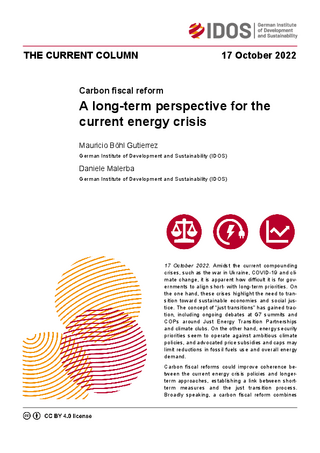Carbon fiscal reform
A long-term perspective for the current energy crisis
Böhl Gutierrez, Mauricio / Daniele MalerbaThe Current Column (2022)
Bonn: German Institute of Development and Sustainability (IDOS), The Current Column of 17 October 2022
17 October 2022. Amidst the current compounding crises, such as the war in Ukraine, COVID-19 and climate change, it is apparent how difficult it is for governments to align short- with long-term priorities. On the one hand, these crises highlight the need to transition toward sustainable economies and social justice. The concept of “just transitions” has gained traction, including ongoing debates at G7 summits and COPs around Just Energy Transition Partnerships and climate clubs. On the other hand, energy security priorities seem to operate against ambitious climate policies, and advocated price subsidies and caps may limit reductions in fossil fuels use and overall energy demand.
Carbon fiscal reforms could improve coherence between the current energy crisis policies and longer-term approaches, establishing a link between short-term measures and the just transition process. Broadly speaking, a carbon fiscal reform combines two components. One is the pricing of carbon emissions, including removing carbon subsidies, which discourages polluting behaviour. The second component is the spending of the revenues raised. One promising way of spending revenue is through social programmes that protect people from higher prices during the transition process. Current policies to address the energy crisis also use transfers to households to cushion price increases. In addition, current research shows that even in the recent energy price hikes, implementing carbon pricing and redistributing revenues to households would increase welfare compared to the situation of stabilising prices. Targeted transfers would help vulnerable households while incentivising emission reduction from the richest, as the wealthiest 10% globally emit 50% of global emissions. Therefore, transfers to households are critical, and evidence from the carbon pricing literature provides an orientation on implementing them.
First, targeting and redistribution strategies of governments should address existing poverty and inequalities, as well as political economy barriers. During the energy crisis, governments have used universal price measures, such as caps and subsidies for gas prices, as well as transfers to all citizens or more targeted assistance to the most vulnerable segments of the population. Bruegel finds that all European countries but Hungary provided targeted support to vulnerable groups. As underlined by literature on the public acceptability of climate policies and carbon pricing, the perception of fairness affects the success and impact of policies. However, the energy crisis shows that governments face challenges in identifying these vulnerable groups during large shocks. Moreover, designs need to overcome political economy barriers, particularly addressing important stakeholders alongside vulnerable households such as energy providers, the private sector, higher income households. Therefore, well targeted transfer to poorer households can free fiscal space to address these other important stakeholders.
Second, clear communication on what objectives and intended effects social transfers should have is key. Governments must ensure that citizens understand what benefits they can receive from the government and how transfers improve distributional justice and benefit vulnerable households. In the past, carbon fiscal reform benefits encountered a lack of public awareness, as citizens in countries that redistributed carbon pricing revenues were not sufficiently informed. This was the case in Canada, which provided an income tax credit, and Switzerland, where citizens have been receiving rebates as a discount on their health insurance premiums.
Lastly, low and middle-income countries are more constrained in their redistributive options due to budget constraints combined with lower technical and informational capacity. For instance, information systems like comprehensive single registries support social protection systems. Their crucial role in addressing shocks through targeted measures became evident during the COVID-19 pandemic. Thus, lower-income countries often use universal subsidies instead of more targeted cash transfers due to lower capacity to implement targeted measures. This can have negative fiscal and environmental consequences. Therefore, improving information systems for short- and long-term reforms is critical. Especially lower income countries require support to strengthen their technical capacities for the just transition. This is critical if price hikes, including for fuel and food, become worse in poorer countries.
Together, this shows that policymaking in the energy crisis should not diverge from just transitions. Otherwise, countries might miss the opportunity, as happened in their COVID-19 recovery packages, to strive towards climate goals in a socially just way. Given their potential, carbon fiscal reforms are planned in many countries and will be critical to achieving climate targets while protecting and promoting vulnerable households in the coming years.
The authors Mauricio Böhl Gutierrez and Daniele Malerba are working in the BMBF-funded research project "How does the COVID-19 pandemic affect climate policy? Case studies on climate targets, recovery spending, and carbon fiscal reform (COVCLIM)".



